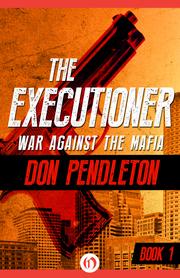
First published in 1969; published digitally by Open Road Media on December 16, 2014
When Mack Bolan's father goes nuts and shoots Mack's sister, brother, and mother after learning that Mack's sister was turning tricks to pay off the father's mob debt, Mack decides that the police are too hampered by quaint notions like due process and proof of guilt to obtain justice. Trained as an Army sniper, Mack decides to use his skills to start his own war against the Mafia. Just like Vietnam, it's an unwinnable war, but The Executioner intends to fight it anyway. What follows is a series of 37 or 38 novels written by Don Pendleton and hundreds more stories by other authors in which Mack Bolan advances his war by taking "direct action, strategically planned, and to hell with the rules."
I was young when The Executioner books came out. Whenever I saw an Executioner novel on the supermarket paperback rack, which was pretty often, I bought it. I didn't read all of the Pendleton-penned Executioner novels but I read quite a few of them. I remember that there was a certain sameness to the stories after a time, but the series as a whole is fun, if a little trashy.
Rereading War Against the Mafia, I was surprised by the prose, which is of a higher quality than I remembered. When I first read the novel, I was probably more interested in the sex scenes and the mayhem, both of which are plentiful (but not so plentiful as to make the novel lurid or distasteful, at least by my admittedly relaxed standards). This isn't great literature but the writing is of a reasonably high caliber when compared to current action novels.
Mack Bolan regards his war against the mafia as a holy war, a war of "ultimate good versus ultimate evil." Like any holy warrior, he is not subtle. The novel is at its weakest when Pendleton introduces philosophical discussions (as when Mack argues about the righteousness of his cause with the virgin he has just deflowered). The inability to recognize shades of gray in the good vs. evil perspective bothers me when I encounter it in modern vigilante justice novels, but Mack makes a more eloquent attempt at justifying his savagery than most vigilantes manage, and that counts for something.
The women in this novel are either whores or desperately in love with Mack or both. The ex-virgin's attitude ("I don't care if you're a killer, just come back to me, you've ruined me for other men") is ridiculously unrealistic. The misogyny I failed to recognize when I was a kid in 1969 stands out now, but the macho attitude is a product of the novel's time. For that reason (and because the novel really isn't meant to be taken seriously), I'm willing to cut it some politically incorrect slack. Readers who are tired of current vigilante novels might want to look at War Against the Mafia to gain perspective on one of the originators of the subgenre.
RECOMMENDED